Humankind Review
Can Humankind compete with Civilization?
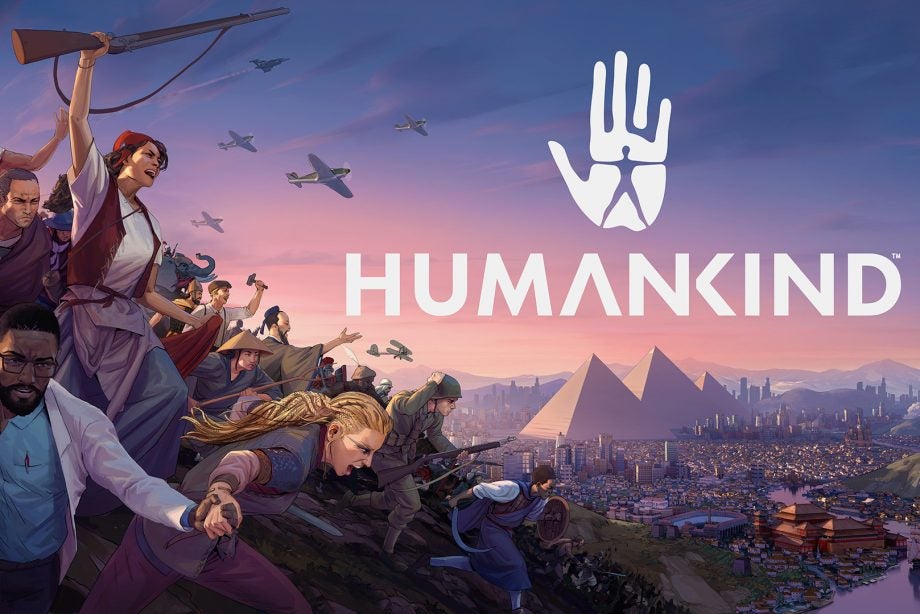
Verdict
Humankind is a classic turn-based strategy game that invites comparisons to the Civilization series. Its unique spin of allowing players to combine multiple cultures does differentiate it from its rivals, but Humankind doesn’t quite offer enough to push the genre into uncharted territory.
Pros
- Unique multi-culture concept
- Lots of replay value with 60 cultures
- Large-scale combat is superb
- Civics and narrative stories shape identity of your empire
Cons
- Custom avatars lack personality
- AI is not aggressive enough
- Trade and diplomacy could be improved
- Endgame can feel monotonous
Availability
- UKRRP: £39.99
- USARRP: $49.99
Key Features
- Turn-based strategy:Humankind feels like an elaborate board game with the tile-based system.
- 60 playable cultures:Allows you to mix and match 60 different cultures, creating unique combinations in each playthrough.
- Tactical combat:Combat is very tactical, with terrain, unit types and fortifications influencing the outcome.
Introduction
It’s impossible not to compare Humankind with Civilization VI. Both are turn-based strategy games that see you speed through human history and develop a small ancient tribe into a sprawling modern city.
But calling Humankind a knock-off clone would be unfair. While the core premise is largely the same as Civilization, there are also some major departures. Rather than picking one already established civilization like Brazil, France or England, Humankind instead allows you to choose from 60 different cultures and mix them together to create unique combinations.
Humankind has also introduced its own combat system, with confrontations triggering a self-contained skirmish that are well suited to large-scale sieges. The use of fame points and predefined territory borders also help to further differentiate Humankind from its strategy-based rivals.
However, not every departure feels like an improvement, with Humankind arguably feeling like a step backwards in many respects. I still had a lot of fun during my playthrough, but by the end, I was more excited to play another round of Civilization VI than start afresh with a new custom-built culture.
Cultures
- Can create unique combinations with the 60 playable cultures
- Past cultures didn’t impact gameplay as much as I’d like
- Custom avatars lack the personality of Civ’s historic leaders
The most fascinating and unique aspect of Humankind is that you don’t stick with one culture throughout a campaign, but instead accumulate new civilisations every time you enter a new era in human history.
For example, I started off with the Olmecs in the Ancient Era, but later added the Celts, English, Dutch, Mexicans and Turks to my melting-pot civilization. Every new culture adds a unique building and unit to your roster, while offering a specific yield boost that stays with you for the entire campaign – medieval England grants you extra food, while contemporary Japan reduces the cost of technology. Humankind offers a whopping 60 different cultures (10 per era), allowing for an incredible number of combinations.
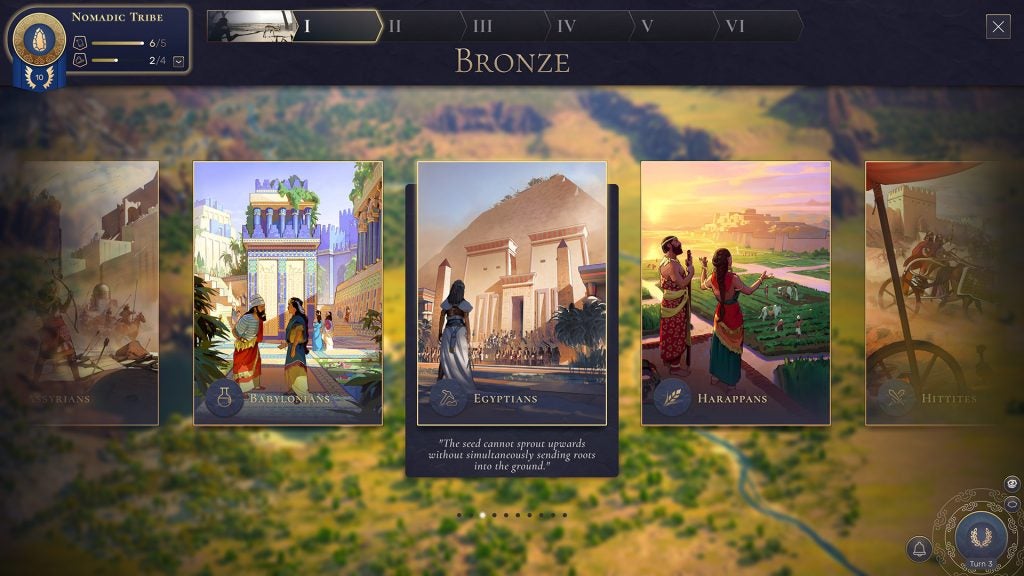
This approach allows you to mix together various yield boosts to create countless synergies. I personally focused on maximising my influence to claim new land in the early rounds, and then increased food output to see the population boom, but plenty more tactics are available to experiment with, enabling lots and lots of replay value. This also affords you the flexibility to change tactics halfway through a campaign, just in case you’re ready to ditch religion in favour of science.
While I was initially impressed with this new approach, I was disappointed by how little this mechanic impacted my overall experience. When adopting a new culture, I often forgot about my historic roots, with the aesthetic of my city capital, the name of settlements and hidden background modifiers proving to be the only indicators of my Celtic heritage.

You also use a custom-created avatar to represent your culture, but that consequently means they’re void of any personality, which is disappointing compared to the fantastic cast of historic leaders in Civilization VI. This impacted my interactions with rival settlements, as while enemy AIs do have their own distinct personality, they’re not as entertaining or engaging as the likes of Cleopatra or Queen Victoria.
I’d like to see Humankind expand further on the concept of gelling together multiple cultures, whether that’s through future updates or DLC, as it has massive potential. But as the unique selling point of Humankind, it’s not quite deep enough to sway me from similar turn-based titles right now.
City building
- Very similar city building mechanics to Civilization
- Trade and diplomacy both feel half-baked
- Civic systems adds distinctive identify to your empire
Boot up Humankind for the first time, and you’ll likely think “this looks a lot like Civilization”. It uses a board game-esque tile system, with every tile featuring its own basic yields. These are essentially the building blocks of your civilization, with food increasing the city’s population, industry speeding up the construction of buildings, money paying for the upkeep of units and science unlocking game-changing technology.
This is pretty much the standard formula of city-building strategy games, with Humankind resisting the urge to reinvent the wheel. However, it does differ to the likes of Civilization in that territory borders are established before you’ve even captured or built a city outpost. This means you can hold a large amount of land in the early stages of the game, but you won’t actually take advantage of a tile’s yield until you build the relevant districts.
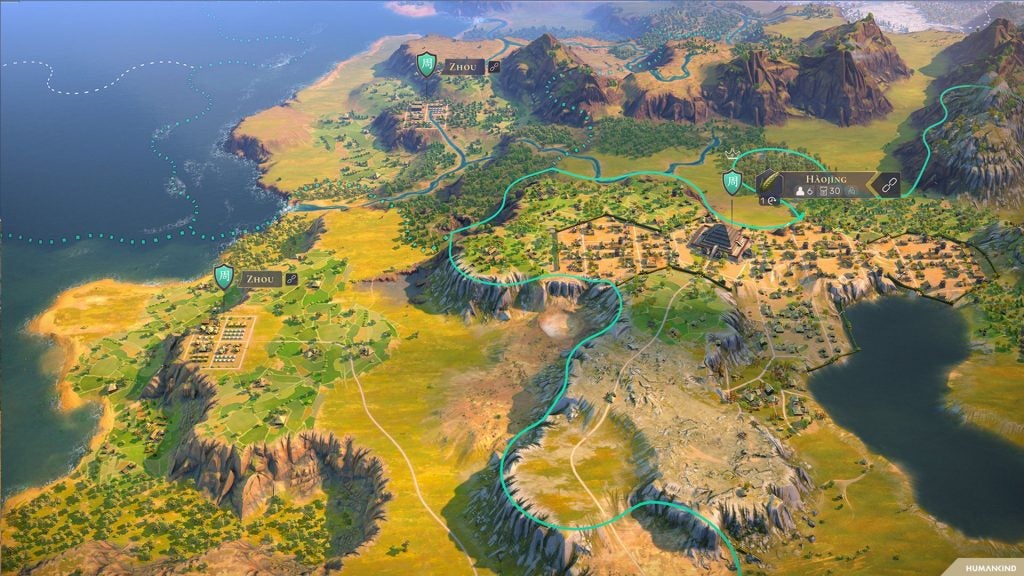
Since you’re able to claim large spaces of land early on, the map starts to feel claustrophobic very quickly. This means you’ll have to either conquer neighbouring settlements to expand your borders further, or sail to uncharted territories in search of new land. Most conflicts with rival civilizations will also ignite because of shared borders, forcing you to either calm down tensions or declare war.
In practise though, these tensions generally only resulted in annoying pop-up alerts of my rival’s grievances – rarely were they brave enough to declare war, even when possessing larger armies. I also personally missed the satisfaction of growing a tiny settlement into an enormous city, with my large stretches of land in Humankind feeling underserved.
Humankind also features luxury and strategic resources. The former provides economic bonuses, especially for trade. Strategic resources, such as Iron, Horses and Oil, can also be used to unlock advanced units and infrastructure, making particular territories more valuable than others.
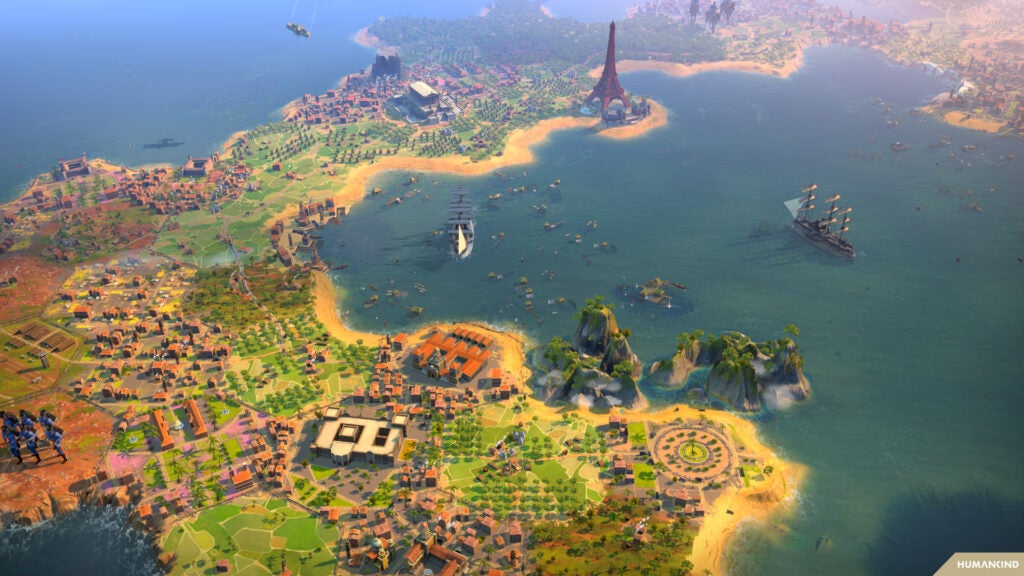
Unfortunately, I was disappointed with the trade system that allows you to profit from these resources. I could sign treaties with allied empires to enable trading, but I was unable to negotiate a price or set specific resources for sale – the process is instead automated, with empires purchasing your goods at the standard rate.
This was frustrating, as while I was happy to sell my horses on for profit, I was less keen to provide access to my iron mine unless I was offered an extraordinary sum of money in return. As a result, the trading system doesn’t feel very interactive, which is odd when a number of cultures are built around trade.
I was, however, impressed by the Civic system, which allowed me to pick out my own customs, traditions and laws. You can make your city more progressive than traditionalist, or vice versa. Narrative stories also occasionally pop up, requiring me to answer numerous social and political dilemmas. These can trigger both positive and negative consequences further down the line, such as improving stability or depleting your finances. Both of these features did a great job at providing my culture with a distinctive identity, while also throwing in some chaos to make future events more unpredictable.
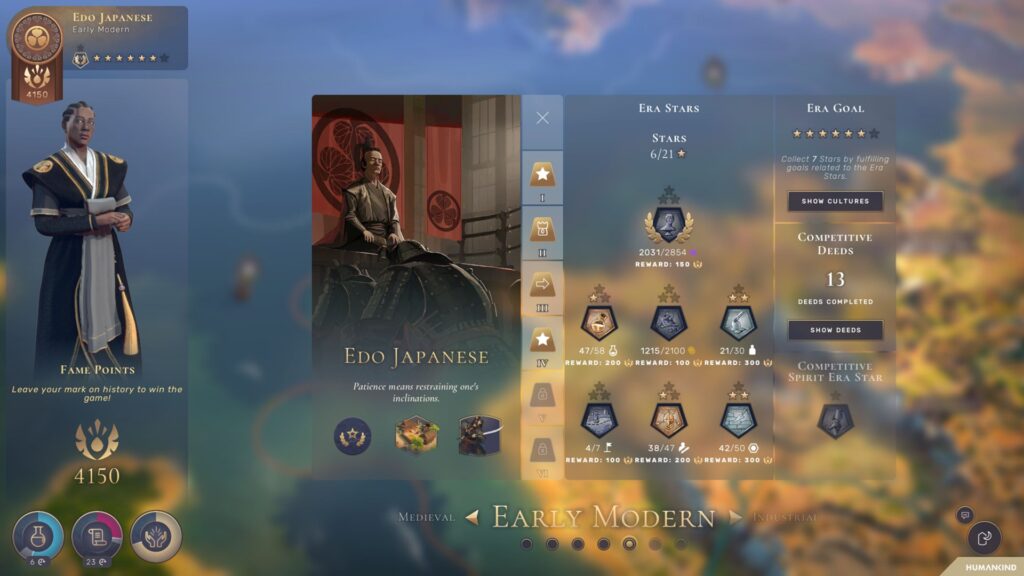
The game is won after 300 rounds by whoever has amassed the most Fame points. These are earned by completing Era Star objectives, such as reaching a specific population count, taking over land or earning money. You’ll get bonus Fame points for meeting yield requirements that your culture specialises in, but focusing too much on your specialty could be costly, as you’ll need to excel in multiple areas in order to collect enough stars to progress to the next era.
The end of my first playthrough was rather anticlimactic, with my rival too far ahead in fame points to catch with 30 turns remaining. There was little I could do to turn the tide, even after taking over multiple territories by force. But then again, I still enjoyed my playthrough, with the final data-driven recap offering a useful insight of where I both excelled and underperformed in each era.
Combat and War
- Combat is very strategic with self-contained arenas
- Support is required to declare war on rival empires
- AI isn’t aggressive enough, making combat mostly optional
The one area that Humankind arguably trounces Civilization VI is combat. Instead of allowing enemies to strike your units and then flee across the map, Humankind will pull armies into a self-contained, inescapable arena once a confrontation is triggered.
You’ll first be given the chance to pick the starting tile for each unit, allowing you to create a defensive formation when protecting a settlement, or begin a sneaky manoeuvre to strike the enemy in the rear. The attacking team will prove victorious if they either wipe out the opposing army or capture and retain the enemy flag.
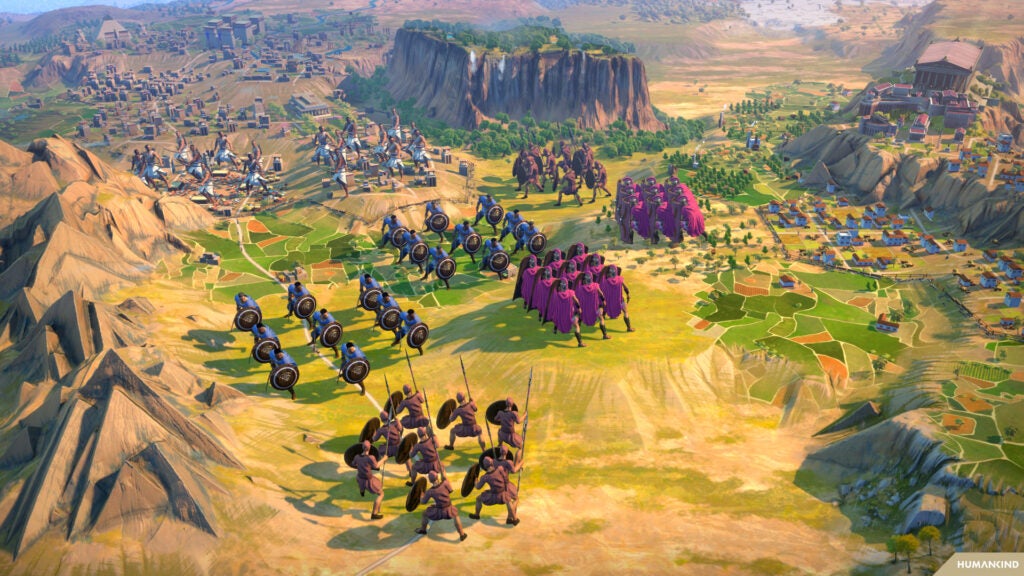
This combat system is particularly effective for large-scale sieges with multiple armies. Defensive positions such as city barricades, rivers and mountainous terrain can provide a significant advantage, allowing you to use strategic positioning to overcome larger and more advanced armies. This also adds an extra incentive to position your outposts in defensive positions, forcing you to think about more than just resource tiles.
Humankind also features the fantastic War Support feature, with your population gaining an appetite for warfare once rival empires perform dastardly acts such as attacking your unit, allying with an enemy, or trespassing on your land. Once your war support hits 85, you’ll be able to declare a formal war on an empire. Winning battles and occupying enemy settlements will see the opposition lose war points. Once a team’s war support hits 0, they’ll be forced to surrender and agree to your demands, whether that’s paying you lots of money or handing over land.
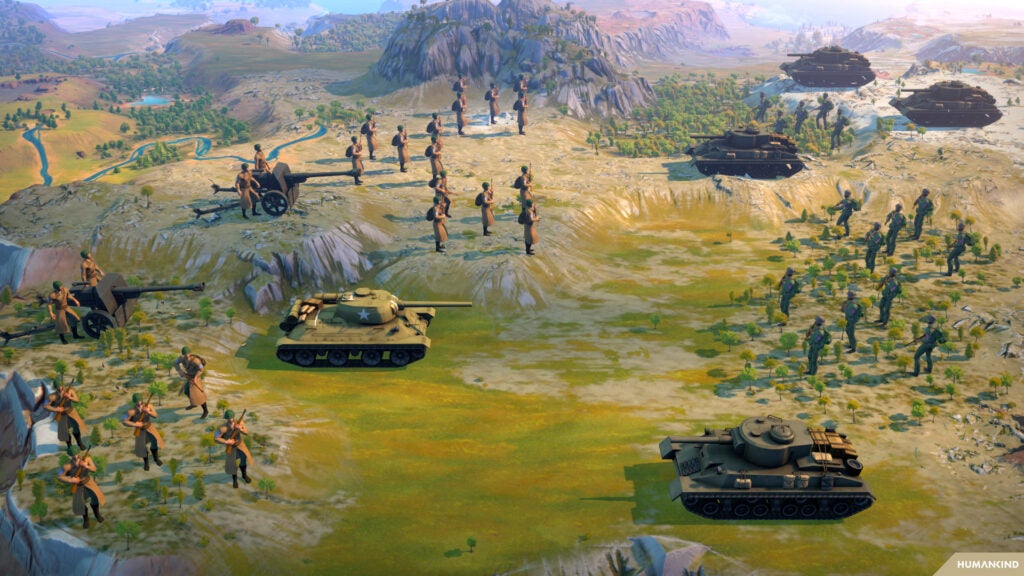
It’s a smart system, but despite numerous enemies amassing a 100-point war support against me, they rarely ever declared war. In fact, only one of my outposts were attacked during my first 16-hour playthrough, which seems bizarre since I did little to appease tensions in the diplomacy screen.
I asked Amplitude Studios about this during the hands-on event, and they said other empires will only attack you if they’ve got a good enough incentive. While I can appreciate this added realism, I still feel that the AI could be more aggressive to provide more conflict. As it stands, there isn’t much incentive to fortify settlements or build armies for defensive purposes.
Latest deals
Should you buy it?
You’re a Civ addict who wants more:
If you loved Civ, then you’ll likely enjoy Humankind, with similar mechanics but different approaches to combat and playable cultures.
You’re looking for the next best strategy game:
There isn’t much here that will be new to veteran strategy game players, so don’t expect Humankind to be a striding step forward for the genre.
Final Thoughts
I had a lot of fun with Humankind, with its deep city building mechanics keeping me glued to the screen for hours on end. But with its unique multi-culture mechanic failing to improve upon solid foundations set by other turn-based titles, I’m unsure why anyone would choose to play Humankind over the likes of Civilization VI. That said, with a fantastic combat system and its unique core concept, Humankind has lots of potential to develop into a more competitive title in the strategy genre, so keep an eye out for future updates and DLC.
How we test
We play every game we review through to the end, outside of certain exceptions where getting 100% completion, like Skyrim, is close to impossible to do. When we don’t fully finish a game before reviewing it we will always alert the reader.
Took 16 hours to complete one campaign
Tested on PC
FAQs
Yes, it’s very similar to Civilization, but features a twist in that you can combine multiple cultures instead of just sticking to one.
Humankind is available to play on both Steam and Google Stadia.
Expansion packs have not been confirmed yet, but we reckon it’s highly likely that they will arrive after launch.








